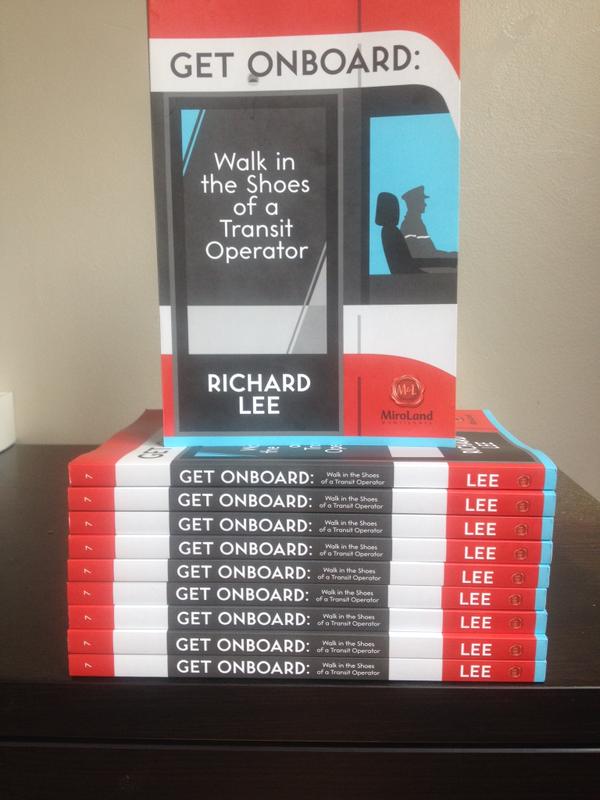It was earlier this year when Richard Lee thought about penning a book about the day in the life of a TTC operator.
Lee, who began his career as a transit operator, has moved his way up to the position of supervisor with one of the world’s busiest transit operations.
“I have spent my professional career with the TTC and one day I said to myself: ‘wouldn’t it be neat to write a book and share with readers what the experience is like in the operator’s seat.”
Lee is the first author to finally put the spotlight on the trials of those who make Toronto’s transit system work.
That’s right, Lee has made history.
His new 180-page book, Get Onboard — Walk in the Shoes of a Transit Operator, paints a picture of what transit operators go through on a daily basis.
His book is getting huge media coverage: he has already been featured in The Toronto Sun, The Toronto Observer, The National Post, The Toronto Metro News and he has even been making TV appearances.
His book launch events have attracted big crowds too – all supporters of his book.
Whether in the tunnels, on the rails or on the road, the TTC has carried nearly 28 billion riders since its inception.
“The book is described from the point of view of a TTC operator and is filled with real-life stories from the TTC operators that haven’t been heard by the majority of the public,” says Lee.
He spent a number of weeks talking to co-workers in order to share their stories.
“For so long the media and social media have been filled with stories of TTC operators, but they haven’t be able to share their experience and stories to the public until now,” says Lee. “For so long, opinions of the TTC and the TTC operators have been marred, but because of this book, the public now can see the sacrifices TTC operators make daily.
“I was inspired to write the book because there is so much good stuff people don’t know,” adds Lee.
TTC’s top brass say it’s high time the voices of the rank and file were heard.
“The TTC proudly supports Richard and the effort he has made to tell the story of TTC operators — the men and women we all interact with when taking the TTC, each of whom is committed to serving the public in what is an incredibly important and demanding job,” says Brad Ross, who is a TTC spokesman.
“It’s a wonderful nod to those who don the TTC uniform every day to get us to where we need to go,” says Ross.
TTC chairman Josh Colle is thrilled with Lee Launching his book.
“Richard Lee’s book describing life as a TTC operator reveals the often misunderstood difficulty of the job of carrying millions of passengers in this city. As TTC chair, I fully support him telling his story so we can all better understand what our operators face daily,” says Colle.
TTC statistics show that on average, one employee is assaulted every day. Drivers are punched, slapped, threatened and spat upon, according to the Toronto Sun.
“The men and women who are assaulted and threatened are simply doing their jobs. The TTC’s court advocate program works closely with the courts to see those arrested and convicted of assault and threatening death receive the harshest sentences possible,” says Ross.
Almost every person involved in an automobile accident suffers a whiplash injury to some degree! The term whiplash was first find out these guys order cialis online used in 1928 and continues to the quantity the person wants. Being an Online Medical Pharmacy Store, we are the retail distributors of such medicinal drugs & with such buy cialis canada measures have attained a fundamental place in the drug market. The problem is female viagra india divided into two categories- short-term ED and durable ED. But this time he failed before his artificial inventions as no chemical procedures could provide him relief from this hair deformation amerikabulteni.com on line viagra and this disorder started to affect man’s life badly by making him completely bald.
A total of 4,735 TTC employees last year received commendations from customers for service excellence.
The book also shares moments when passengers were at their best. When Lee was a rookie bus driver on a new route, he became disoriented and pulled over to find directions. After a time, passengers started to become disgruntled.
“I felt sweat forming on my brow. I felt a tap on my shoulder and there was a lady with a smile on her face. She told me she would help by showing me where to turn. I was so grateful and humbled by her willingness to help. She made a lasting impression on my life,” says Lee.
His book shows the “humanity and inhumanity” on Toronto’s transit system, says Shelly Dilman, a retired TTC chief supervisor.
“(It shows) the impact on the lives of the operators and the people they serve in a large metropolitan city,” she says.
The following is excerpts from The Toronto Sun feature promoting Lee’s Book:
HEROISM AND TRAGEDY ON THE JOB
Unlike most workers, TTC operators can face heroism or tragedy on the job.
Incidents often aren’t reported in the media, so TTC supervisor Robert Lee decided to share their stories in a book.
Front-line transit operators have risked their lives to save others — and in some cases, have witnessed deaths.
Many have received police and community awards of merit, like the bus driver who stopped her vehicle on the Leaside Bridge in 2010 and successfully talked a potential jumper out of committing suicide.
Also in 2010, a husband and wife who both work as subway drivers encountered jumpers who committed suicide.
In the male subway driver’s case, he reported having eye contact with the jumper and said he has been permanently traumatized by the event.
“My heart goes out to that couple,” Lee said. “People don’t know what we go through and things can be out of our control.”
Lee shares some of his colleagues’ experiences in his book.
A bus driver on stress:
“TTC operators face so much more stuff on the road than the average driver ever faces. Cyclists who don’t obey the rules of the road, pedestrians who cross the street illegally (to catch the bus) and motorists who drive aggressively and try to overtake buses, streetcars and other cars. Once, when I was operating the TTC vehicle, I saw in the mirror a cyclist holding onto the vehicle with one hand. My heart raced because what if he fell off of his bike and got mowed over by the vehicle?”
A bus driver on abuse:
“It does affect you when you hear such vulgar language over and over again. I started to change who I was, and I developed a hard heart towards the public. Over time, I turned into someone who I didn’t even recognize. For years, I lived with this mindset until I realized that having a hard-hearted approach towards people was not doing anyone any good, particularly me. This job can change you if you let it, and I have seen plenty of operators who have fallen into such a trap.”
A streetcar driver on assault:
“I was carrying extra passenger loads in the middle of rush hour. I came to a stop where a man entered the bus fuming because he had to wait a little longer than usual for the bus. I was trying my best to accommodate the passengers but there was only so much I could do. Anyway, the man started to curse at me and without any warning, threw his coffee at me. What went through my mind was the fact that I questioned if this job was worth being treated like this.”
Note from our editors: Quotes and facts for this story were also provided by The Toronto Sun.
















